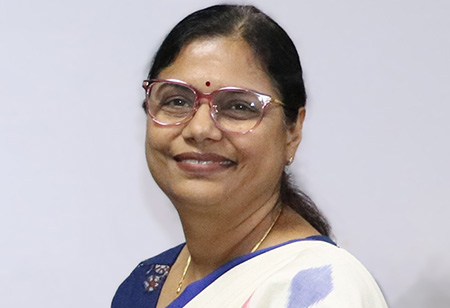Integrating 21st-century skills in Pharmacy Education
 Prof. Shubhini A Saraf, Director, National Institute of Pharmaceutical Education and Research (NIPER), Raebareli, in an exclusive interview with Higher Education Review, shares her views on the importance of ethical decision-making in pharmacy practice, how digital literacy can be integrated into pharmacy curricula, how pharmacy education prepares students for a globalized healthcare system and more. She is a well-experienced Professor with a demonstrated history of working in the higher education industry. Shubhini is also an ethical research professional skilled in Drug Delivery, Pharmaceutics, Life Sciences, Pharmaceutical Research, and Lipid nanotechnology.
Prof. Shubhini A Saraf, Director, National Institute of Pharmaceutical Education and Research (NIPER), Raebareli, in an exclusive interview with Higher Education Review, shares her views on the importance of ethical decision-making in pharmacy practice, how digital literacy can be integrated into pharmacy curricula, how pharmacy education prepares students for a globalized healthcare system and more. She is a well-experienced Professor with a demonstrated history of working in the higher education industry. Shubhini is also an ethical research professional skilled in Drug Delivery, Pharmaceutics, Life Sciences, Pharmaceutical Research, and Lipid nanotechnology.
Given the fast pace of technological and medical advancements, How can adaptability and flexibility be cultivated in pharmacy students to respond to the rapidly changing healthcare landscape?
In this present era, there is a knowledge explosion in every field with advancements taking place, and students have to consider upskilling and reskilling all the time and how they will do this; they have to make some plans in mind as to how they will upskill themselves. So, upskilling would be skills that already exist; all they need to do is learn what is advanced in their area or arena. Also, many of these could happen through online learning portals, additional degrees, or programs they can take, which would help with upskilling.
When it comes to reskilling, it's a new skill that has to be learned when you have to reskill. So, it could even be switching channels from your area of expertise; we do not see too much scope in that field and want to switch channels and learn a new skill. So, whenever we want to learn a new skill, we can do it online. Still, it is always preferable to learn a skill in the physical mode where we can probably join some type of course, maybe an evening class, or it could even be through symposia, workshops where you get hands-on training. Hence, whenever we reskill, mostly hands-on training is required and ordinarily cutting-edge skills that differentiate you from others who are called an expert in the field, which is something every student needs to reason out for themselves and work towards.
As healthcare becomes more interconnected globally, how can pharmacy education prepare students for a globalized healthcare system?
Healthcare is a holistic approach that is not merely for a pharmacy person. However, it will be for many other paramedical professionals who take charge or care for a particular person's health. So, we need to teach each of these curricula about the health disparities between different geographical locations and infectious diseases, which may be particular to a specific region and some pan-world.
For instance, the pandemic was called a pandemic because it existed in all parts of the world. Moreover, it becomes endemic when it is only in a particular region, and we are not bothered about global disparities or inequities. So, this is something that needs to be learned.
From a production point of view, we are talking specifically about pharmaceutical science students. The students need to know about international drug regulatory affairs and the various type of agencies, their standards for approval and quality control. This is essential when we talk about a global healthcare system. Also, there are disparities in affordability. Particular countries can afford medication even if it is expensive. Still, many countries cannot, especially third-world countries, where developing countries cannot afford as much as developed countries.
Hence, disparities in affordability, how they can be addressed, the differences in the supply chain, how to maintain a cold chain, where can it happen quickly and where we would need to put an extra effort so that the cold chain is maintained and there is availability, or there is last mile connectivity for whatever needs to be given. Especially in the case of vaccines or biologics, much attention has to be given to storage and transportation.
As pharmacists become more involved in direct patient care, how can ethical reasoning and decision-making be included in pharmacy education?
There is a very diverse patient population, and they can sometimes be very informed about their rights, what the disease is about, and life expectancy. They also know that if they take a specific treatment, how much will it improve their quality of life? There could be some patients who are unaware of all these facts.
So, ethically, we need to inform these patients, who do not know what they are entering, how much they would require to take a particular treatment and how long they could afford it. That is the ethics involved, plus informed decisions that every patient has the right to make. Then, this has to be given by healthcare, and it ought to be provided by pharmacists who can explain it to the patient.
In the case of patient care, the sort of pharmacy role, which is like a community pharmacy role, is not much in India right now as that is the role taken by doctors and mostly in developed countries; there are specific, for instance, if a doctor has to diagnose, it will be the pharmacist who will prescribe, whereas, in India, a doctor does both these roles. So, there is a difference between healthcare outside India and in developed countries like the US, Australia and others.
As healthcare becomes increasingly reliant on digital tools, how can digital literacy be integrated into pharmacy curricula to align with the growing use of health technologies?
There is a rapid explosion of knowledge and advancement. Advancements are happening in a fast-paced, as many tools help in research and healthcare, and that is why digital literacy has become very important in this age and era. So, it could be tools like telepharmacy or medication adherence monitoring tools, which could be simple software or a simple app that exists on a mobile device, or it could be things like AI, ML and data analytics, which help the researcher to take decisions, lot of data and analyze it and find out what is the best solution. This solution can be thought at the end of a doctor as well, where he is trying to diagnose for a patient what the actual disease is and taking into consideration a lot of data in the background and analyzing that, or it could also be to come out with a new healthcare solution or a personalized solution, all with the help of AI, ML and data analytics and that is why it becomes essential for every pharmaceutical science student to be tech-savvy.
Ethical dilemmas frequently arise in pharmacy practice, What is the importance of ethical decision-making in pharmacy practice, and how can it be reinforced in pharmacy education?
Pharmacy practice is a niche area taught in very few institutes in India and most places where it is a specialization. Students usually want to go abroad to practice pharmacy because there is less scope in India, and this domain is mainly shared with doctors. Hence, pharmacy practice is not very prevalent in India.
Pharmacy practice and ethical decision-making must be taught to students through relevant case studies and real-life scenarios. Pharmacy practice students usually go to hospitals along with doctors. They take rounds, where they get real-life scenarios. That is where they can analyze the ethical implications of different decision options that exist for a patient and what needs to be shared.
So, all this can only happen when real-life scenarios are given to students, and that is where they'll learn relevant case studies, which is also a good way of teaching. Then, balancing the patient confidentiality and reporting potential abuse wherein there are some habit-forming drugs, the patient may be faking pain just to get some pain relievers prescribed, and basically, it may be so much needed by the patient. So, that is a potential abuse situation where students, practitioners of pharmacy practice, or even doctors need to either take care of this or report such malpractices if they exist and report potential abuse if possible. Also, they should insist if we are talking about a pharmacy where drugs are sold.
Practitioners, although they are not pharmacy practice practitioners but are pharmacy professionals who are sitting in drug stores, also need to make sure that they have the appropriate physician's prescription. They need to dispense only the proper quantity that the doctor has prescribed so that abuse does not happen, and they should also be able to advise the patient. There are instances where patients may have certain personal beliefs that they are not going to take with this or this is too much dose of the antibiotics, so they are not going to take for these many days.
So, the pharmacy professional is at the interface, and a doctor may not be there to advise. At this point, the pharmacy practitioner should be able to tell the patient that if they do not do this, it could lead to antimicrobial resistance and to a situation where this drug will no longer be of use to anybody, as microbes may develop resistance and so on.

